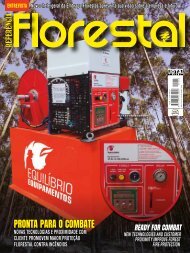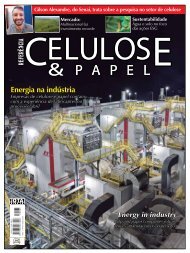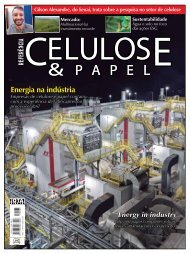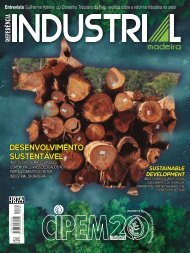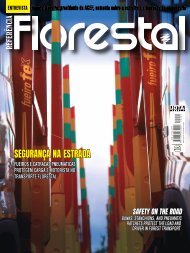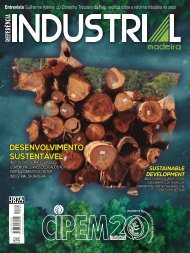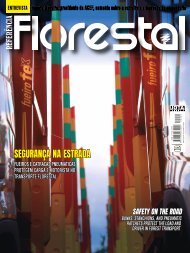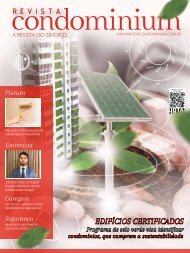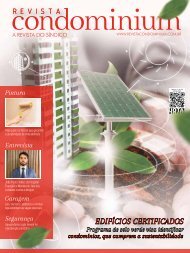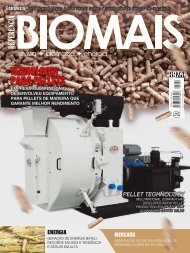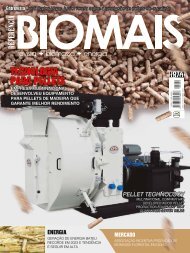MadeiraIndustrial_254Web
You also want an ePaper? Increase the reach of your titles
YUMPU automatically turns print PDFs into web optimized ePapers that Google loves.
ENTREVISTA<br />
natural de atração de indústrias para alguns municípios,<br />
aproveitando as economias de aglomeração, que se<br />
traduzem em melhores condições de competitividade.<br />
Isso fez com que algumas regiões fossem colocadas à<br />
margem do crescimento econômico, principalmente da<br />
industrialização. No entanto, políticas de desconcentração<br />
são complexas e devem ser focadas, não na taxação<br />
da região que apresenta condições mais favoráveis, tampouco<br />
no desincentivo ao crescimento dessa região, mas<br />
em instrumentos que possibilitem que as regiões menos<br />
desenvolvidas incrementem suas condições de competitividade<br />
face às regiões mais industrializadas. Importante<br />
também considerar vocações naturais de desenvolvimento,<br />
obedecendo as vantagens comparativas de cada<br />
região. O reconhecimento dos vetores de crescimento<br />
regionais e setores industriais potenciais, assim como a<br />
infraestrutura logística necessária são fundamentais para<br />
adequar serviços de capacitação empresarial, qualificação<br />
de mão de obra, ensino fundamental e a oferta de serviços<br />
públicos qualificados.<br />
A FIEB TEM INCENTIVADO A ADOÇÃO DA ECO-<br />
NOMIA CIRCULAR. A PARTIR DESTA EXPERIÊNCIA,<br />
COMO AVALIA A ADOÇÃO DESTA INICIATIVA PELO<br />
SETOR INDUSTRIAL?<br />
A indústria brasileira já tem adotado práticas para o<br />
melhor aproveitamento dos recursos naturais, mas precisamos<br />
avançar neste caminho, que é irreversível. A economia<br />
circular associa crescimento econômico a um ciclo<br />
de desenvolvimento sustentável, permitindo a redução de<br />
custos/perdas produtivas por meio da diminuição da dependência<br />
de matérias-primas virgens. O mercado exige<br />
que todos façamos parte deste movimento. A conscientização<br />
da sociedade para a importância deste tema ainda<br />
é necessária, além de políticas públicas que estimulem<br />
a gestão estratégica dos recursos naturais, promovam a<br />
inovação e incentivem a pesquisa.<br />
A CNI TEM UM TRABALHO VOLTADO PARA FOR-<br />
MAÇÃO ACADÊMICA E DE TRABALHADORES PARA<br />
A INDÚSTRIA. COMO É REALIZADO O TRABALHO<br />
NA PRÁTICA PELAS FEDERAÇÕES NOS ESTADOS?<br />
A formação profissional de mão de obra é um dos<br />
desafios de competitividade para a indústria. Por isso,<br />
preparar e qualificar a mão de obra para aumentar a<br />
produtividade sempre esteve no foco das ações da CNI.<br />
process of attracting industries to some municipalities,<br />
taking advantage of the agglomeration economies,<br />
which translated into better competitiveness conditions.<br />
This caused some regions to be placed on the<br />
sidelines of economic growth, especially industrialization.<br />
However, deconcentration policies are complex<br />
and should be focused not on the taxation of the<br />
region that presents more favorable conditions, nor on<br />
the disincentive to the growth of that region, but on<br />
instruments that enable the less developed regions to<br />
increase their conditions of competitiveness vis-à-vis<br />
the more industrialized regions. Considering natural<br />
development vocations and obeying each region’s<br />
comparative advantages are also important. Recognizing<br />
regional growth vectors, potential industrial<br />
sectors, and the necessary logistics infrastructure is<br />
fundamental to adapting business training services,<br />
labor qualification, elementary education, and qualified<br />
public services.<br />
FIEB HAS ENCOURAGED THE ADOPTION OF<br />
THE CIRCULAR ECONOMY. FROM THIS EXPERIEN-<br />
CE, HOW DO YOU SEE THE ADOPTION OF THIS<br />
INITIATIVE BY THE INDUSTRIAL SECTOR?<br />
The Brazilian Industrial Sector has already adopted<br />
practices for the best use of natural resources, but we<br />
need to continue on this path and not turn back. The<br />
circular economy associates economic growth with a<br />
cycle of sustainable development, allowing the reduction<br />
of productive costs/losses through the decrease<br />
in dependence on virgin raw materials. The market<br />
demands that we all be part of this movement. The<br />
awareness of society for the importance of this theme<br />
is still necessary, in addition to public policies that stimulate<br />
the strategic management of natural resources,<br />
promote innovation, and encourage research.<br />
THE CNI HAS FOCUSED ON ACADEMIC AND<br />
WORKFORCE TRAINING FOR INDUSTRY. HOW DO<br />
YOU SEE THIS BEING CARRIED OUT IN PRACTICE<br />
BY THE STATE FEDERATIONS?<br />
Vocational workforce training is one of the competitiveness<br />
challenges for the Industrial Sector. Therefore,<br />
preparing and qualifying the workforce to increase<br />
productivity has always been the focus of CNI’s actions.<br />
For this, it has the support of the entities that are part<br />
INDUZIR O CRESCIMENTO PARA O INTERIOR É UM DOS PRINCIPAIS<br />
DESAFIOS PARA OS FORMULADORES DE POLÍTICAS PÚBLICAS. É<br />
NECESSÁRIO PROPORCIONAR CONDIÇÕES PARA QUE AS CIDADES DE MÉDIO<br />
PORTE POSSAM SE DESENVOLVER, APROVEITANDO SUAS POTENCIALIDADES<br />
PARA CRIAR RIQUEZAS<br />
44 referenciaindustrial.com.br AGOSTO 2023




